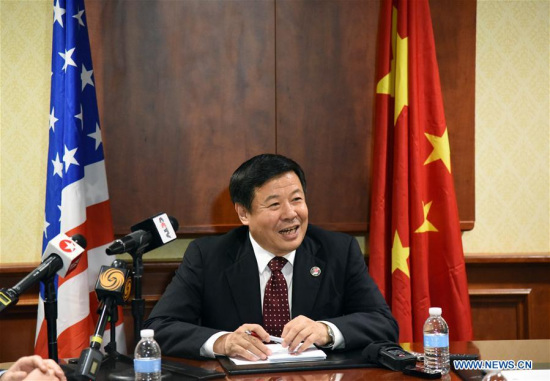
Chinese Vice Minister of Finance Zhu Guangyao speaks at a press briefing after the conclusion of the first China-U.S. Comprehensive Economic Dialogue (CED) in Washington D.C., the United States, July 19, 2017. (Xinhua/Jin Minmin)
Both China and the United States recognized that steel overcapacity is a global issue that requires a global solution, a senior Chinese official said Wednesday.
At a press briefing after the conclusion of the first China-U.S. Comprehensive Economic Dialogue (CED) in Washington D.C. on Wednesday, Chinese Vice Minister of Finance Zhu Guangyao said the two sides discussed the issue of steel overcapacity during the one-day high-level economic dialogue.
China shared the same view with the United States that steel overcapacity is a global issue, which requires a global collective response, Zhu said, adding China also emphasized that the excess steel capacity was a result of sluggish global economic recovery.
Meanwhile, the Chinese delegation told the U.S. side that China had actively taken measures to cut steel overcapacity, Zhu said, citing China's plans to reduce steel capacity by 100 million to 150 million tons from 2016 to 2020.
As the world's two largest economies and co-chairs of the global forum on steel excess capacity, China and the United States have maintained policy dialogue and communication regarding the steel glut, Zhu said, noting G20 leaders agreed to establish the forum at last year's Hangzhou summit.
At the G20 summit in Hamburg, Germany earlier this month, G20 leaders called on the forum to fulfill their commitments on enhancing information sharing and cooperation by August, and to rapidly develop concrete policy solutions that reduce steel excess capacity, the official said.
The G20's new commitment to address global steel overcapacity comes as the Trump administration is about to release a report on the national security implications of steel imports in the coming weeks.
In defense of the U.S. steel industry, the Trump administration in April invoked a decades-old, rarely used trade tool, known as a Section 232 investigation under the Trade Expansion Act of 1962, to look into all foreign steel imports.
If the investigation concludes that steel imports would undermine U.S. national security, the trade law would allow the U.S. government to impose tariffs, quotas, or other measures to restrict the imports.
Many trade experts and economists have warned that it would hurt millions of U.S. consumers and thousands of U.S. manufacturers if the Trump administration imposes new restrictions on steel imports.


















































